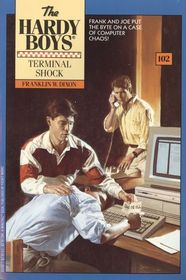For several years, I was Franklin W. Dixon.
I should clarify. I wasn’t the only Franklin W. Dixon nor was I the first or last Franklin W. Dixon, but for over a decade I got to use his name.

Frank and Joe Hardy in the case of the ageless author.
If the name Franklin W. Dixon sounds familiar but you can’t place it, just think about the Hardy Boys. Based on my experience, there’s a very good chance that you or someone close to you read Hardy Boys novels when you or they were young. The Hardy Boys novels are written by Franklin W. Dixon. All of them, going back to 1927 and continuing to the present. Mr. Dixon is a very prolific — and clearly very long-lived — writer.
That’s because he’s not one writer but many writers, all sharing the same pseudonym. The first Franklin W. Dixon was a newspaper reporter named Leslie McFarlane, who wrote most of the Hardy Boys novels published between 1927 and 1946. But there have been plenty of other Franklin W. Dixon’s, most of them since McFarlane retired. I’m only one of dozens. Honestly, I don’t even know who most of the others are. I’ve only met a couple.
Writing is a lonely job.
What brought my stint as Franklin W. Dixon to mind was a phone call that I got a few weeks ago from a reporter. He wanted to know about a specific Hardy Boys book I’d written called Terminal Shock. (I had actually called it The Computer Clue, but editors often change the titles that writers give things. In that case, I’m grateful. The Computer Clue was an awful title.) He was intrigued because Terminal Shock, published in 1990, included concepts like email, online communications, message encryption and, well, things that most people believe only came along in the last few years.
They didn’t. I was just writing about things I was involved with at the time, posting messages online at places like the Compuserve Information Service and local computer bulletin boards that people, often kids, ran out of their own houses from their own computers on their own telephone lines. It wasn’t exactly the Internet (which existed then, even if the World Wide Web did not), but you could exchange messages publicly and privately from your computer keyboard, just like I’m doing now. The technology just wasn’t as slick yet.
You can read the article here on the Fast Company website. The article will tell you a lot of the same things I just told you, but the author goes into more detail. The site says the article only takes eight minutes to read, though, which is probably only a little longer than you’re spending here.
And be sure to click on the link to my name, which will take you recursively back to this blog. I’ll know you did it because I’ll see it in my stats and it’ll tell me that you’re paying attention. Thanks in advance!